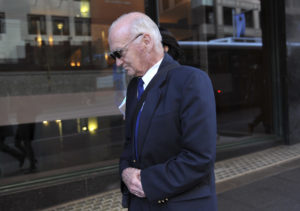A congregational representative from First United Methodist Church of Evanston presented a check for $50,000 to Sol Anderson, CEO of the Evanston Community Foundation, for the Reparations Stakeholders Authority of Evanston group on Sunday, Feb. 27.
The gift followed a powerful sermon by Robin Rue Simmons, architect of Evanston’s reparations effort. Anderson accepted the check in front of in-person and virtual congregants, the choir, church laity and First United Senior Pastor Rev. Grace Imathiu.
This gift represents donations from 91 families to First United’s 2021 Reparations Fund.
The check was presented on a gloriously sunny day, the final Sunday of Black History Month and the final Sunday before the Christian season of Lent begins. Lent is a time of repentance, apologies and forgiveness, of trying to right a wrong.
Imathiu and the First United community are committed to continuing their financial support of reparations this year, starting March 2, the first day of Lent. Their hope is that this support will spur a widespread effort throughout all the communities of faith in Evanston, regardless of denomination, to learn about the history of racism and to support reparations in Evanston.
“This is a historic time in Evanston and First United Methodist Church is excited to join other faith communities as we begin to address our history, ultimately towards a better future for all,” Rev. Imathiu said.
According to Anderson, Rev. Imathiu reached out to him in November 2021 to let him know of First United’s intention, with no mention of the amount of the gift. He was on a Zoom call when he received the email confirming the donation date and amount.
“My initial reaction was, admittedly, one of shock,” he recalled. “I could see my eyes get big and my hands fly up into the air. I was so impressed by the commitment of [First United Methodist Church] and its members to making an investment in repair work in Evanston.”

The centerpiece of the service was Simmons’ Sunday sermon. A lifelong Evanstonian, she described a childhood filled with love and attention from her family, and the security and safety she felt within the boundaries of her neighborhood. It was a neighborhood where everybody knew and looked out for one another. It wasn’t until she was in third grade and had a playdate at a friend’s home in a different neighborhood that Simmons realized that the playing field was not even.
In her sermon, Simmons summarized the history of the reparations movement, how Evanston became the first community in the United States to pass funded reparations legislation and where Evanston is in the process of fulfilling that commitment. She shared powerful statistics with her audience, noting the $46,000 gap in income and a 13-year difference in life expectancy between Black and white households in Evanston.
Simmons noted that the Old and New Testaments have much to say about “acknowledgement, atonement, repentance, restitution, grace, wisdom, humility, service and righteousness,” adding that there are enough examples to warrant forming a Bible study group to discuss them all. As wonderful a community as Evanston is, though, “we can’t celebrate diversity while denying fair access to affordable quality housing and healthy food and clean air based on the color of our skin,” she said.
“The simple truth is, reparations is to repair a wrong that was done. In the case of reparations for the Black community in Evanston and in the United States, it’s a complex and protracted process that requires participation from the entire community. The case for reparations in this context is centuries old starting with the crimes of the trans-Atlantic slave trade and continuing with all of its legacies … lynching, Jim Crow, redlining, the war on drugs, over-policing and police terror, predatory financial practices and in Evanston’s case, anti-Black zoning laws and housing policies that stripped away wealth and opportunity from Black families and Black businesses.”
The service ended with blessings, embraces and fellowship. To learn more about Evanston’s reparations program, explore this section of the city’s website.




